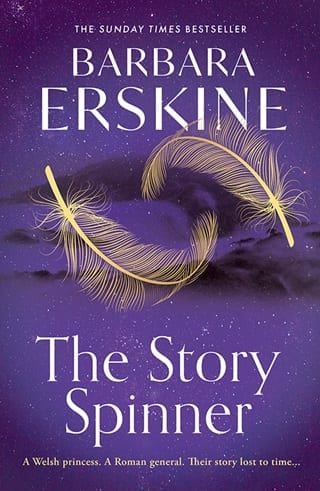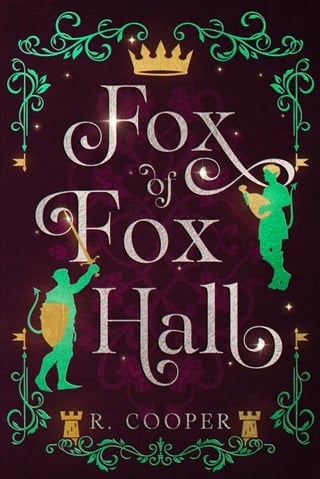2
David rang again next morning. ‘I don't know if this will help but I mentioned the development of the meadow to Donald.' He paused for dramatic effect. Donald was David's cousin, the -family's self-appointed archivist. ‘I remembered he was furious when he realised the family estate, as he called the farm, had been split up before we were born. I think he had illusions about us buying it back one day. I seemed to remember he had once told me there was something special about that field. -Apparently, it's got archaeology, Cadi. There was a family tradition that it was the site of a Roman villa. And he thinks there was an earlier Roman marching camp there as well. And he thinks if it was proved, that might stop them building on it. At the very least they would have to do an exploratory excavation.'
Marching.
Soldiers.
‘Cadi? Are you there? Did you hear what I said?'
‘Yes. Sorry.' She sat down abruptly. ‘I was thinking about something—'
She heard him chuckle. ‘Keep your feet on the ground, girl. Anyway, listen. Donald reminded me. There's a guy in the village– Arwel Davies. Something of an amateur historian. Icouldn't stand the chap. He was an arrogant shit, if I remember, but if he's still around he might know something about it. He used to claim he knew everything there was to know about the village. If there is something there like a fort or a villa, it might stop any development in its tracks. You never know. It's worth a try.'
Arwel. She put down the phone. Oh yes, she knew Arwel. Arwel, with whose son she'd had an intense and ultimately horrifically unhappy affair after the break-up of her marriage. Arwel, who mocked her at every opportunity for her ‘little books', pointedly scorning people who ‘thought they were Welsh just because they had married a Welshman and read a bit of the Mabinogion'. People who claimed to be poets as though it were a real job. Poets like her.
As it happened, she was Welsh, born and bred, but of course in one thing he was right. For most people, poetry wasn't a real job; as it wasn't for her. She couldn't have lived off her earnings. Were it not for David's input after their divorce and the somewhat sporadic payments for her journalistic efforts, she would have needed a real job. Real job. That phrase made her toes curl. Being a poet was a real job, especially in Wales where the bards of old had been honoured and presumably richly rewarded in kind. The fact that she had won prizes for her work and was acclaimed in certain circles led to a few of her neighbours looking at her romantically starry-eyed, but that was it. More often than not people glanced at her askance, like Arwel. Except for Sally. Sally understood. And it wasn't only Sally who had been enthusiastic about her latest enterprise. The reviewers too had been enchanted.
She was working with her cousin Rachel on a new poetic translation of the stories from the Mabinogion, hence Arwel's unpleasant dig. She was rewriting the text in simple verse, and Rachel, a talented artist, was providing the illustrations. One book per ancient story. The ‘little books' Arwel had mocked so scornfully.
Rachel Pritchard was a painter and illustrator by trade and in her lowest, most self-deprecating moments Cadi sometimes suspected it was the wonderful, magical illustrations rather than her own words that made their books so popular. Rachel also lived alone in an old cottage. Hers was on the west coast and from it she ran a thriving business selling her sketches and cards online and in local art galleries who were happy to display her larger works.
The Mabinogion was a collection of ancient stories and -legends, medieval, but much older in origin, first written down in Middle Welsh and now translated in many versions. Cadi's poems were a unique take on the stories, intuitive and full of charm. The first four titles had sold surprisingly well; stories of Celtic gods and goddesses, of love and war, of fairies and magic, the strange, complex stories of ancient Wales that Cadi loved so passionately. And now she and Rachel were about to embark on the fifth.
She sat down at her desk and looked at the books lying open before her. Three different versions. One in Welsh, the other two, translations into English. She idly turned the pages. The difference between fairy stories and legends was that fairy -stories were made up; legends were, however loosely, based on history, or so she had been told– by someone, she thought with a chuckle– who obviously didn't believe in fairies.
The first four stories she and Rachel had published had been mythical and magical, the next in the most usual sequence was based, if only loosely, on history, and at least two, if not more of the characters were based in fact. The story was called ‘The Dream of Macsen Wledig'. Macsen, meaning Magnus or Great, Wledig being the title of a ruler or perhaps even a prince.
The real-life hero of the story wasn't Welsh, he was an -officer in the legions, called Flavius Magnus Maximus, who became Roman emperor of the West, a man who had genuinely lived for at least a time in Wales towards the end of the fourth cen-tury AD and who, according to the story in the Mabinogion, had fallen in love with the Welsh princess he had seen in a dream and had come all the way from Rome to woo her.
When she and Rachel had first discussed their project, Cadi had been doubtful about including this story in the series at all.Perhaps because it contained so much real history, it lacked the magic of some of the others, lacked the profusion of shape-shifting animals and birds that Rachel was so good at depicting, and also because it was very short, perhaps too short for a whole book. But then she had turned back to it. After the dream described in the original, Macsen was so enchanted by the lady and so convinced she was real that he sent messengers from Rome to the four corners of the world to find her. Cadi reached for her notebook. She had been intrigued enough by the story to look it up and make notes about him.
In reality Macsen had never actually been to Rome; he was a soldier and his family probably came from Spain. He was a senior officer of the Roman legions who had fought in North Africa, among other places, and latterly he was stationed in Northern Britain to fight the Caledonian tribes. Only then did history and legend begin to overlap. At some point in his tour of duty in Britannia, he did come to Wales, and there he had found his princess. Her name was Helen or Elen.
Cadi looked up. Elen. The name resonated at the back of her mind. But then of course it was part of the name of her street, of her house. She frowned thoughtfully. It was more than that though. Something important she ought to remember. No, it had gone. If it was that important it would come to her.
She turned back to her notebook. Elen was probably the daughter of a tribal leader or king, known by the Romans as Octavius. In the language of his native country, he was Eudaf, king of the Silures, the tribe who inhabited the south-eastern corner of an area of Britain that would one day be called Wales, the local tribe who had had one of their main townships here, in a hill fort called Bryndinas, outside her windows, on the far side of Camp Meadow.
Romans. A Roman marching camp. Marching. Soldiers. She shivered. Had her new interest in the soldiers of Rome conjured the sounds she had heard in the night? And if so, why? Where were they going?
It was early evening when she reached for her phone. ‘Sal. Are you busy? Can you come over? I want to discuss something with you.'
* * *
‘Well, we knew it was called Camp Meadow because there was a Roman military camp here.' Sally sat forward on the edge of the chair, rolling the glass of wine between her palms. They were sitting outside in the garden. ‘I would have thought the county archaeologists would have known that as well.'
‘Perhaps they do. For all we know it's not important enough for it to stop a rich developer. If it's even true.' Cadi hesitated. ‘Do you believe in ghosts, Sal?'
Sally raised an eyebrow. ‘Interesting question.'
‘And the answer?'
‘I've never seen one. Have you?'
Cadi shook her head. ‘Not as far as I know. It's just'– she took a thoughtful sip from her own glass– ‘I've been hearing things. Don't laugh.'
‘I wasn't going to.'
‘At night. The sound of soldiers marching down the street outside. I've heard it several times. I thought it might be rain on the roof at first, or a dream, but—' She stopped uncomfortably. ‘I wondered if you'd heard it too?'
‘No, not a thing.' Sally grinned. ‘But you know me. I'm so shattered by bedtime I would sleep through an earthquake. Gemma would have barked, though, if she'd heard anything.' Gemma was Sally's dog.
‘Do you think? But what if all the extra interest in the -meadow has stirred something up?'
‘You haven't actually seen anything?'
‘No.'
‘When you say soldiers marching, how do you know they're soldiers if you haven't seen anything?'
‘They march in step. Hobnailed boots. On stone.'
‘No shouted commands? In Latin?'
Cadi smiled. ‘No, no shouted commands.'
Sally sighed. ‘I honestly don't know what to say, but I do think we should follow up the proper history, if there is any.' She hesitated. ‘I wouldn't say anything to anyone else about ghostly noises. It might muddy the water.'
‘Emphasise the dottiness of the poet next door, you mean.' Cadi smiled ruefully.
‘Not dotty. Wonderfully otherworldly. I certainly wouldn't mention it to Arwel. You will go and see him, I presume?' -Sally's response was robust.
‘Unless you would like to do it?' Cadi said hopefully. ‘No. I'm not that much of a coward. I'll do it. Tomorrow.' She reached for the wine bottle and topped up both their glasses.
‘He's jealous of the fact you're a successful author,' Sally went on. ‘So, ignore his sniping. I love your books and I can't wait for the next one. Have you decided which tale it's going to be?'
‘"The Dream of Macsen Wledig".'
‘Aha. A chunk of Romano-Welsh history. That will be good for the box office. I shall look forward to reading it.'
So, Sally had heard of Macsen. But Sally was well read. Her primary school pupils might not be into medieval literature, but she most definitely was.
Macsen.
The name hung in the air, seeming to reverberate around the room.
‘What's wrong? You look as though you've swallowed a wasp.' Sally was still smiling.
Cadi put down her glass and rubbed her face with the flat of her hands. ‘Sorry. It's the heat.'
The June day had been building up towards a thunderstorm and, right on cue, as she spoke they heard low rumbling in the distance.
Sally drank the last of her wine and stood up abruptly. ‘I'd better get home. I've got some marking to do and you know how Gemma hates thunder.' The little dog would already be cowering behind the sofa.
When Sally had gone Cadi sat down again.
‘Macsen,' she whispered.
It was raining again, slow heavy drops, falling on the narrow flowerbed at the front of the house under her open kitchen window. The scent was magical– petrichor– that was what it was called, a word she treasured. The smell of wet rock and earth, the smell of the liquid that flows through the veins of the gods. A word to go in a poem one day.
But until that day came, there was Macsen.
She looked round uncomfortably. The word drummed with the rhythm of the rain.
Of the marching feet.
‘No!' She pushed back her chair and ran to the front door, pulling it open. Beyond the gate the road was empty. She flinched as lightning zigzagged across the sky in the distance.
She could still hear them marching. Marching. A troop of men, carefully in step. Left right. Left right. In the distance. Menacing. Inexorable.
There was another flash on the horizon and the sound stopped. Silence except for the rain drumming on the ground.
She slammed the door and stood with her back against it, listening. There was nothing to be afraid of. It was her imagination playing with the sound of the rain. She could hear a car now, its tyres swishing on the wet road. It approached, passed the house and the sound faded into the distance.
Cadi went over to her desk and stood looking down at her notebook. Macsen. Marching feet. Roman soldiers. She -shivered.
 Fullepub
Fullepub 



